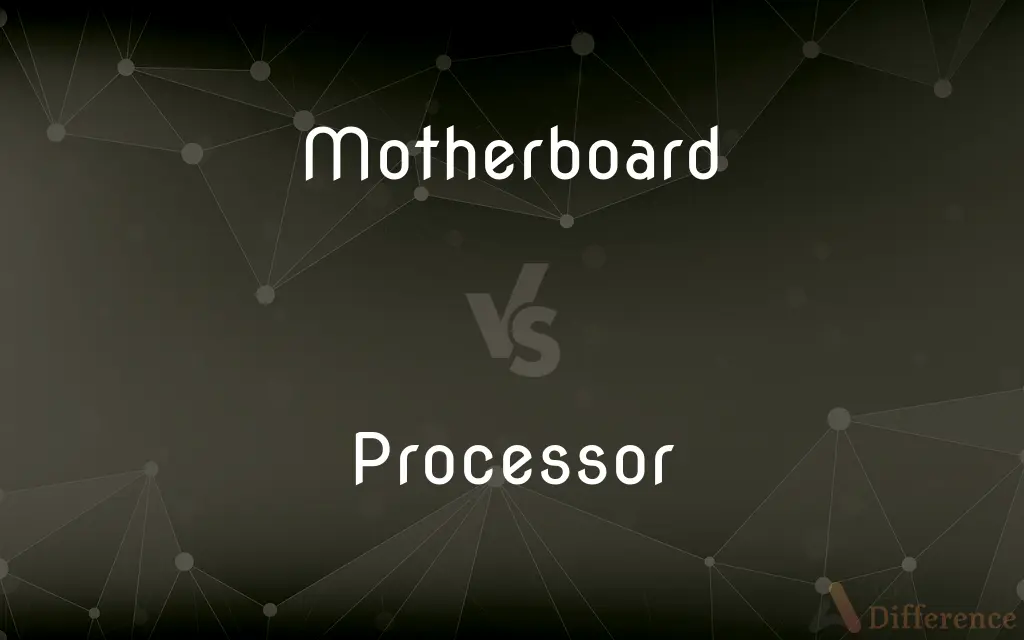Motherboard vs. Processor — What's the Difference?
By Tayyaba Rehman & Maham Liaqat — Updated on March 13, 2024
A motherboard is the main circuit board hosting and connecting all computer components, while a processor (CPU) is the brain of the computer, executing instructions.

Difference Between Motherboard and Processor
Table of Contents
ADVERTISEMENT
Key Differences
The motherboard serves as the foundational platform for a computer, onto which various components like CPUs, memory, and storage devices are connected and communicate. It includes slots for these components and ensures they work together seamlessly. On the other hand, the processor, also known as the Central Processing Unit (CPU), is a critical component mounted on the motherboard, responsible for executing instructions and processing data.
While the motherboard acts as a nerve center, facilitating communication between all parts of the computer, the processor performs the computational tasks essential for running applications and operating systems. The performance of a computer heavily relies on the processor's speed and efficiency, whereas the motherboard's capabilities determine the types and number of components that can be installed.
Processors come in various types and speeds, designed to handle everything from basic computing tasks to complex data analysis and graphic rendering. Conversely, motherboards are designed with specific sockets and chipsets to accommodate particular processors, dictating compatibility and performance potential.
The evolution of technology has seen both motherboards and processors becoming increasingly sophisticated, with motherboards supporting faster data paths and more connectivity options, and processors achieving higher speeds and greater efficiency with multiple cores and advanced architectures.
While the motherboard provides the infrastructure for building a computer, the processor does the actual computational work. Both are crucial for a computer's operation but play distinctly different roles in its functionality and performance.
ADVERTISEMENT
Comparison Chart
Function
Connects and allows communication between all computer components.
Executes instructions and processes data.
Role in Computer
Serves as the platform for assembling a computer.
Acts as the brain of the computer, performing computations.
Key Components
Slots for CPU, RAM, storage, expansion cards.
Cores, cache, clock speed.
Performance Impact
Determines the types and number of components that can be connected.
Directly influences computing speed and efficiency.
Compatibility
Must match the processor’s socket and chipset.
Must be compatible with the motherboard's socket.
Compare with Definitions
Motherboard
Acts as the backbone for connecting all components.
He upgraded his motherboard to support more RAM.
Processor
Executes computer programs and instructions.
The processor's speed determines how fast the computer runs applications.
Motherboard
The main circuit board of a computer.
The motherboard hosts the CPU, memory, and other peripherals.
Processor
Varies in speed, measured in GHz.
The new CPU clocks at 3.5 GHz, providing swift processing capabilities.
Motherboard
Determines the computer's expandability.
This motherboard can support up to four graphics cards.
Processor
Can have multiple cores for multitasking.
This quad-core processor handles multitasking effortlessly.
Motherboard
Varies in size and form factor.
ATX and MicroATX are popular motherboard form factors.
Processor
Directly affects the computer's ability to run software.
A faster processor means smoother gaming experiences.
Motherboard
Includes specific slots and ports for components.
The new motherboard features additional USB 3.0 ports.
Processor
The heart of computing operations.
Upgrading the processor boosted the computer's overall performance.
Motherboard
A motherboard (also called mainboard, main circuit board, or mobo) is the main printed circuit board (PCB) in general-purpose computers and other expandable systems. It holds and allows communication between many of the crucial electronic components of a system, such as the central processing unit (CPU) and memory, and provides connectors for other peripherals.
Processor
A machine that processes something
The processor overexposed the film
Motherboard
A printed circuit board containing the principal components of a computer or other device, with connectors for other circuit boards to be slotted into.
Processor
One that processes, especially an apparatus for preparing, treating, or converting material
A wood pulp processor.
Motherboard
The main printed circuit board in a complex electronic device, such as a personal computer, usually containing the central processing unit, the main system memory, and other components essential to the device's operation.
Processor
A computer.
Motherboard
(computer hardware) The primary circuit board of a personal computer, containing the circuitry for the central processing unit, keyboard, mouse and monitor, together with slots for other devices.
Processor
A central processing unit.
Motherboard
The board containing the main circuits of an electronic device, especially computers. The term is used primarily in microcomputer literature, where it designates the board containing the main expansion bus, and usually also the cpu. On motherboards designed with an expansion bus, often all of the circuits not contained on an expansion card are on the motherboard.
Processor
A program that translates another program or a data file into a form acceptable by the computer being used.
Processor
A person or institution who processes things (foods, photos, applications, etc.).
He is a loan processor with a bank.
Processor
A device which processes, which changes something (a computer processor, food processor, etc.).
The food processor shredded the vegetables.
Processor
A central processing unit.
This mainframe's processor is fast.
Processor
A microprocessor.
This computer has two processors, but only one keyboard.
Processor
A business engaged in processing agricultural products and preparing them for market
Processor
Someone who processes things (foods or photographs or applicants etc.)
Processor
(computer science) the part of a computer (a microprocessor chip) that does most of the data processing; the CPU and the memory form the central part of a computer to which the peripherals are attached
Common Curiosities
How does a motherboard affect computer performance?
The motherboard determines the computer's expandability and compatibility with various components, indirectly affecting performance.
What are the key factors to consider when choosing a motherboard?
Compatibility with the CPU, type and number of expansion slots, and form factor are key considerations.
What does a processor do?
A processor executes instructions and processes data, performing the computational work of the computer.
What is the main function of a motherboard?
The motherboard connects and facilitates communication between all the computer's components.
Can a computer work without a processor?
No, the processor is essential for executing programs and operating the computer.
What improvements do new generations of processors bring?
Newer generations typically offer better performance, energy efficiency, and support for advanced technologies.
Can you upgrade the processor without changing the motherboard?
Yes, but the new processor must be compatible with the motherboard's socket and chipset.
Is it necessary for the motherboard and processor to be from the same manufacturer?
No, but they must be compatible in terms of the processor's socket type and the motherboard's chipset.
How does the processor's clock speed affect computing?
Higher clock speeds can process instructions faster, leading to better overall performance.
What is the difference between CPU and GPU?
The CPU (Central Processing Unit) handles general-purpose computing tasks, while the GPU (Graphics Processing Unit) is specialized for rendering images and video.
What is a chipset on a motherboard?
A chipset controls data flow between the processor, memory, and peripheral devices, affecting compatibility and performance.
Why are some motherboards more expensive than others?
Price differences are often due to features like support for faster memory, more expansion slots, and additional connectivity options.
How do multiple cores in a processor improve performance?
Multiple cores allow for better multitasking and efficient processing of complex tasks by handling multiple operations simultaneously.
How do you know if a processor is compatible with your motherboard?
Check the motherboard's CPU socket type and chipset against the processor's requirements.
How does upgrading the processor or motherboard affect a computer?
Upgrading can significantly improve performance, expandability, and support for newer technologies, enhancing the computer's capabilities.
Share Your Discovery

Previous Comparison
Understanding vs. Knowing
Next Comparison
Humerus vs. FemurAuthor Spotlight
Written by
Tayyaba RehmanTayyaba Rehman is a distinguished writer, currently serving as a primary contributor to askdifference.com. As a researcher in semantics and etymology, Tayyaba's passion for the complexity of languages and their distinctions has found a perfect home on the platform. Tayyaba delves into the intricacies of language, distinguishing between commonly confused words and phrases, thereby providing clarity for readers worldwide.
Co-written by
Maham Liaqat















































